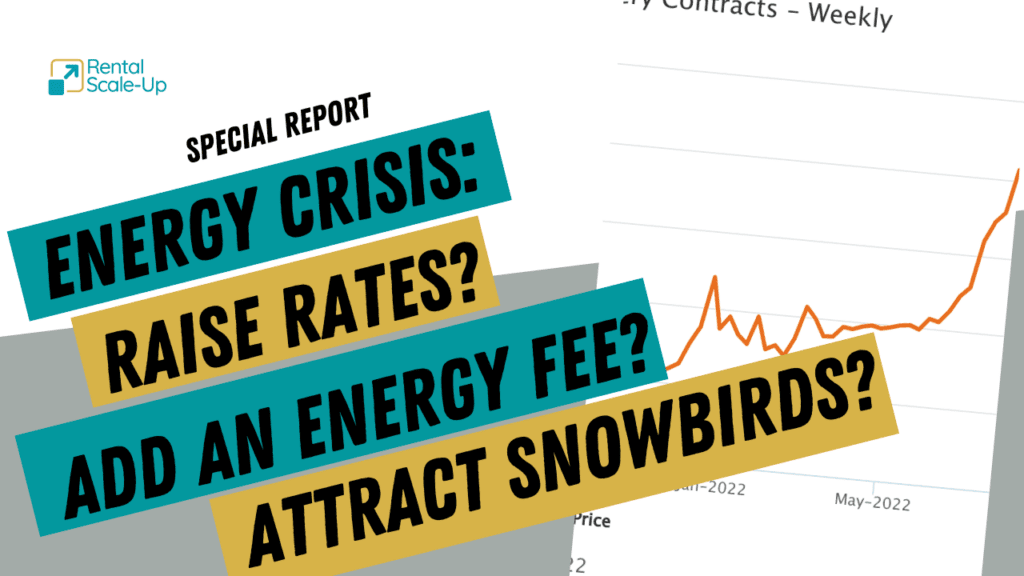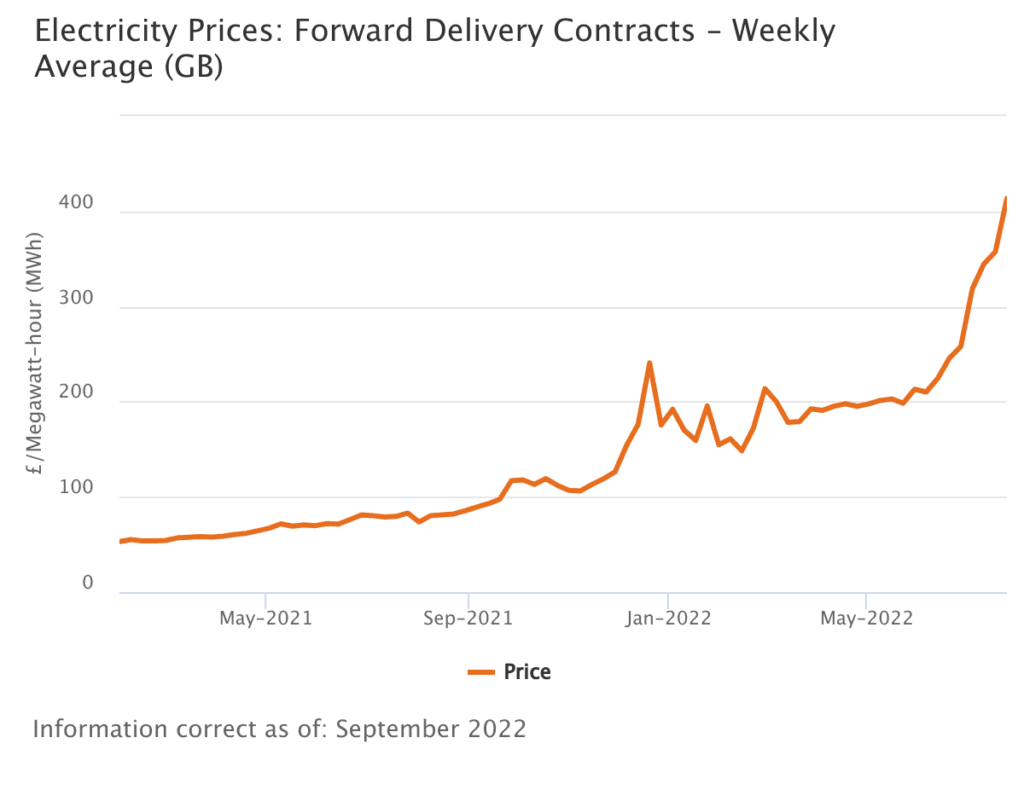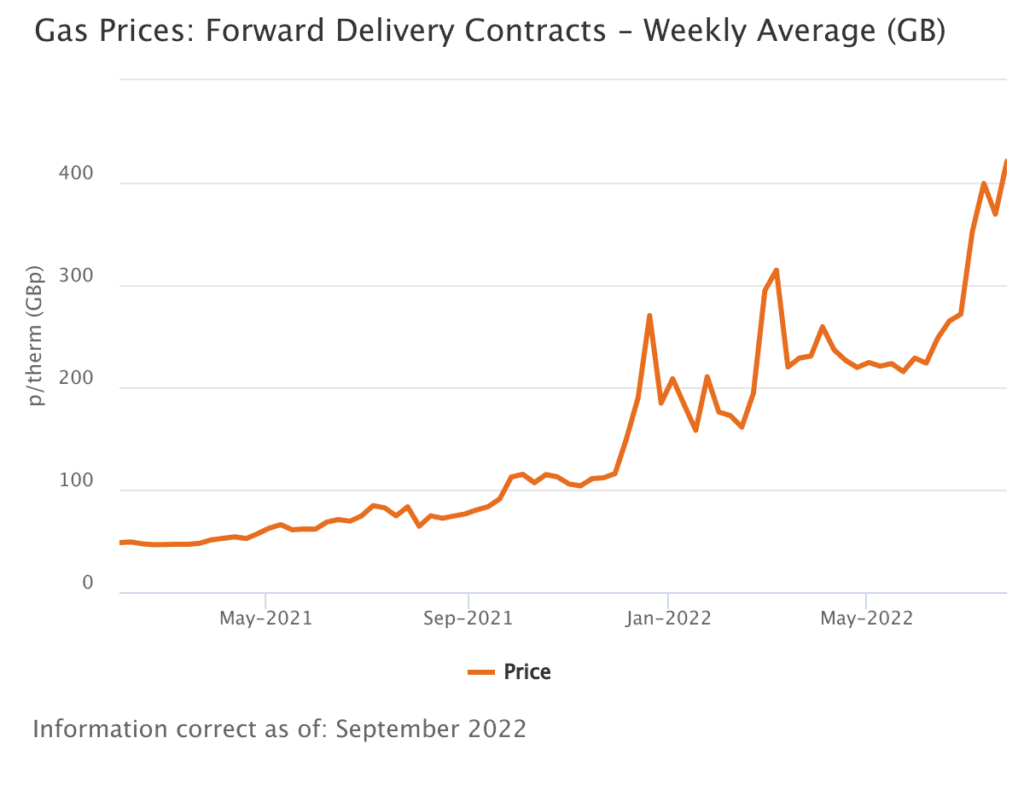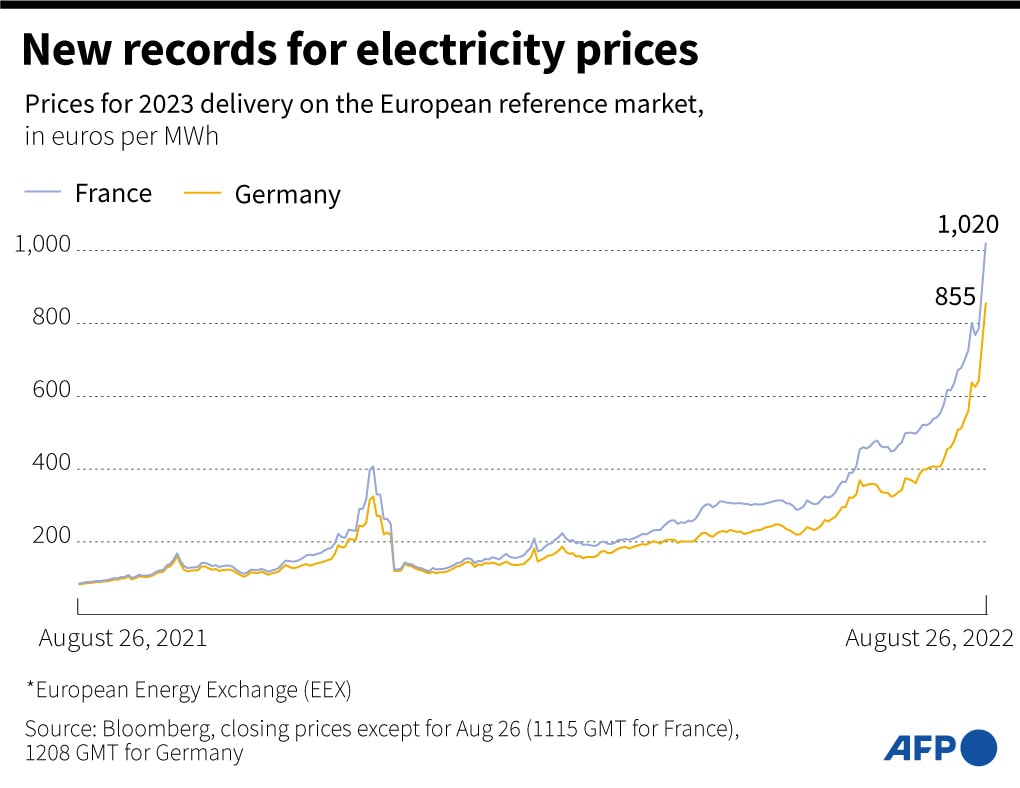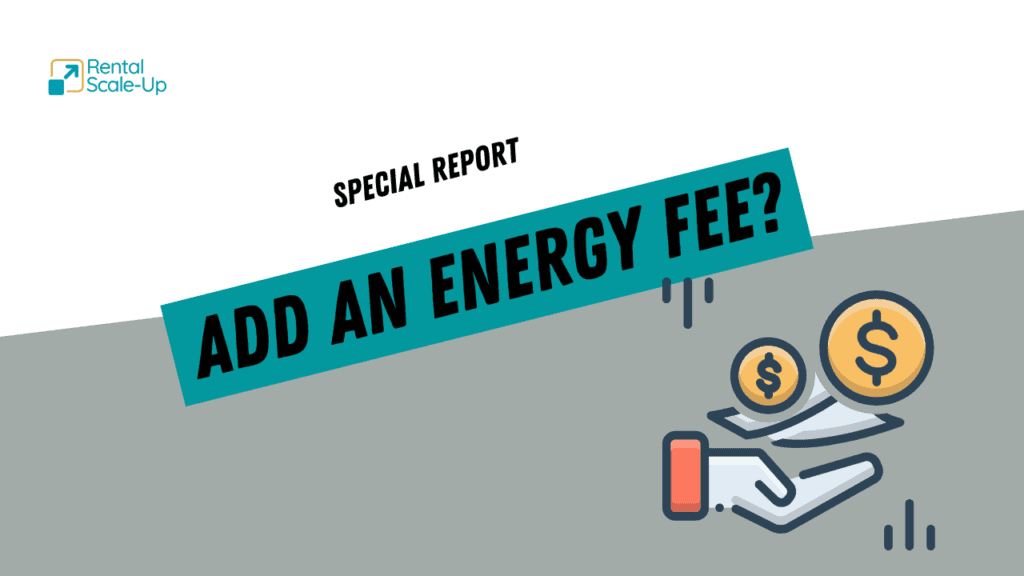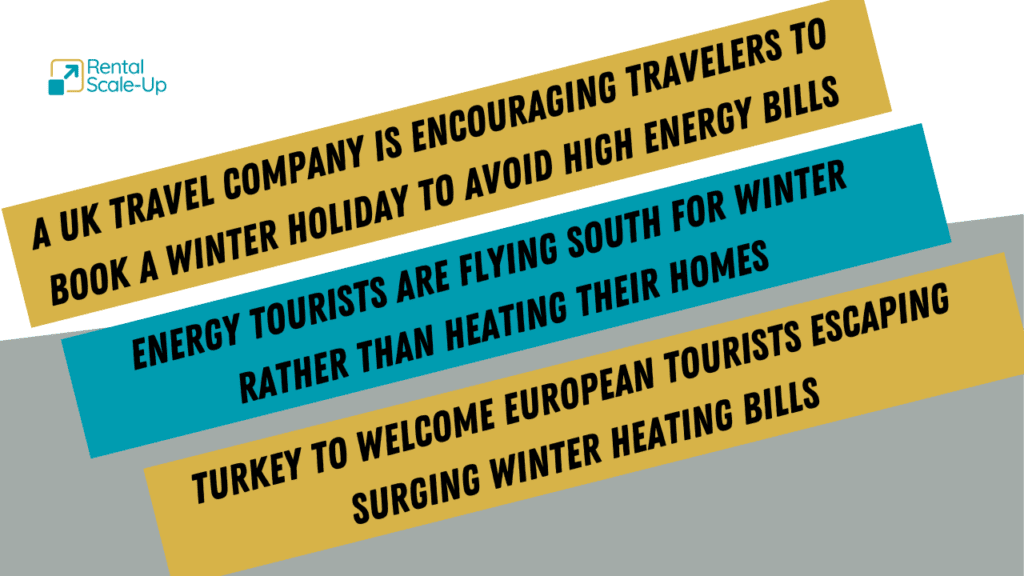High energy costs are hitting consumers and property owners, especially in Nothern Europe. We’ll have a look at some graphs showing the staggering increases in gas and electricity in some markets. Homeowners and vacation rental homeowners are all the more hit as 85% of the EU’s building stock was built before 2001. It means that people running short-term rentals in quaint English cottages, traditional chalets in the Alps, or apartments in small German medieval towns are seeing their costs increase and profitability decline. What can they do? We’ll see that passing costs through increased rates and additional energy fees are one possibility. Start-ups are springing to help, by educating guests on their actual energy consumption to get them to lower bills. In the medium and long term, making vacation rental homes more energy efficient is also a way to make tourism a bit more environmentally friendly.
Rising energy costs are hitting Europe and its older, not always energy-efficient, stock of vacation rental homes
Energy prices can hit Europe’s vacation rental markets in various ways:
- Higher energy bills mean less disposable income for European travelers
- Vacation rental homeowners may also face rising costs and face the need to increase booking prices to preserve their profitability
- The housing stock in Europe is older and not always up to the latest energy-saving standards.
- The pain is not uniform in Europe, as markets located in Northern and Central Europe, dependent on gas, and/or with very liberalized energy markets, are taking the biggest hit. The need and cost to heat one house in Northern England compared to another in Southern Spain in winter are very different.
The rise in energy prices hits both travelers and vacation rental operators
Let’s have a look at a few telling graphs, showing the drastic increases in energy prices. Notes that some graphs reflect spot market prices, i.e. the most expensive price paid on the market on a given day. As governments and the EU are stepping, these energy prices may be capped for the winter, but at a level at least twice as high as the previous year.
GRAPHS= UK, Germany, and France. Gas and electricity (sources: Ofgem for the UK, AFP for France and Germany
The impact on tourism figures is not just local, as cross-border bookings are big in Europe. So, if you are a Spanish short-term rental owner or manager whose source markets are the UK or Germany, you may get impacted by the decrease in purchasing power due to high energy costs in some big Northern European countries.
Just in the US, according to a large survey done by Travel Boom Marketing, 36% of travelers say they may cancel planned vacations due to budget concerns. Imagine what it could be like in the UK or Germany.
Housing stock: both homes and vacation rental homes
Europe’s buildings are both unique and diverse in their expression of the continent’s culture. But not surprisingly, they’re also old! More than 220 million units were built before 2001, making up 85% of all EU-built structures.
European buildings, in general, are less energy efficient than they could be. The majority of them rely on fossil fuels for heating and cooling which is not only costly but also produces greenhouse gases that cause climate change.
As a consequence, Europeans may suffer both as consumers and as vacation rental owners.
What can vacation rental owners and managers do in the face of rising energy costs?
Pass on the cost increase through higher night rates and extra fees linked to actual energy consumption
The obvious solution would be for vacation rental operators to increase average daily rates (ADRs) paid by guests to compensate for increased energy costs. Yet, would it be a wise move, when ADRs have raised so much over the last two years, and the purchasing power of some travelers is being hit?
Could an alternative rest in making guests pay for the energy that they consume? What would it look like?
In some markets, charging for electricity and gas has always been a thing, as mentions Simon Lehmann from AJL Atelier:
Owners are looking at turning their short-term rentals into long-term rentals so they don’t have to bear the utility cost. But at the same time, it has been common practice in Denmark, Spain and Italy to charge for consumed electricity and gas prior to the crisis. We will see the guests bear some of these rising energy costs!
Indeed, in traditional vacation rental regions in France, where the 48,000 “gîtes” (rural vacation rentals) are popular property types, charging guests for their energy consumption is still often a rule. It may be a surprise to foreign travelers or to the Airbnb generation to see a vacation rental owner look at how much electricity they’ve consumed and ask them, for instance, for €40 more in energy fee.
If you need some inspiration, this is what one of the “Gîtes de France” local associations is recommending to its members when it comes to charging for energy consumption:
Heating
Heating is not necessarily included in the rental price. If included, it is specified in the description of the gite. If it is not included, the difference between the initial and final meter readings will be charged by the owner.Electricity/Electric heating
8 kWh a day is included in the rental price. Any excess consumption will be paid to the owner at your departure (at the current Electricité de France rate). An electric meter reading will be done in your presence at your arrival and on the day of your departure.Wood
A supplement may be asked if you use wood for a wood stove or a fireplace. The gite owner will inform you of the amount per cubic meter.
Here’s how hospitality and real-estate consultant Henrietta Kiss sees it:
Raising prices, controlling energy consumption (remote/app) – that’s for now.
Next year (other than raising even more the prices), based on this year’s data, also introducing “included energy” in rental and payment on top if exceeded (that’d mean only for super inconsiderate guests).
Educate guests by showing them their consumption in real-time
As guests, we usually tend to be less careful with energy consumption. You may want to update your welcome guides to remind guests to close doors, unplug some appliances, and other tips.
Yet, some start-ups are stepping in to educate their short-term rental guests and nudge them into taking action.
For instance, Sustonica, founded by vacation rental tech leader Vanessa de Souza Lage, is launching a new service that measures the consumption of water, electricity, and gas. The information is fed in real-time back to guests via a wall-mounted iPad in the vacation rental home. The company says that guests, when exposed to sustainability advice and communication (via the iPad and prior email communication) cut down electricity by 27%, gas by 22%, and water by 22%. Property managers can then decide whether they want to charge for consumption or not.
Measure and reduce energy consumption, as part of a sustainability drive
Beyond short-term measures, vacation rental owners can better isolate their houses and replace appliances with more energy-efficient versions. These efforts can also help with making their vacation rental part of more sustainable travel industry.
Is it worth it? What is the cost of non-action? In some countries, such as France, landlords will not be able to rent out houses whose energy consumption has been measured as terrible. The rule applies to long-term tenants looking for a new place, not to short-term rental guests. Yet, could the same type of regulations come to pass and affect the vacation rental industry?
Travel associations, such as the World Travel & Tourism Council (WTTC) try to make accommodations more energy efficient. For insurance, the WTTC has published a 12-point Hotel Sustainability Basics guide, which recommends robust approaches to measuring and reducing energy and water consumption, waste and carbon emissions. Here 4 of the 12 points that the program underlines:
- Measure & Reduce Energy Use
- Measure & Reduce Water Use
- Identify & Reduce Waste
- Measure & Reduce Carbon Emissions
The two most popular ways to reduce energy consumption are by monitoring devices in use and then making adjustments where needed, or through occupancy detection. The newest generation of sensors can go beyond just telling you whether someone is present to determine their location with accuracy as well as what they’re doing at any given time – this includes things like counts on how many people entering/ Leaving a room.
This is what vacation rental property manager Daniela Derin has to say about the topic:
We’re very lucky because we produce 70% of our energy with solar panels on the roof of our building Skol Apartments Marbella. So the cost has remained the same, even throughout the hottest summer ever, when the A/C was on full blast 24/7. I think the only way is to go as green as possible to control costs, but when is not possible and the energy bills go up, the cost will have to go on the final clients with higher nightly rates unfortunately.
Are Northern European energy tourists and snowbirds a promising market for Southern European and Turkish short-term rentals?
You may have across articles such as these ones:
- A UK travel company is encouraging travelers to book a winter holiday to avoid high energy bills
- Energy tourists are flying south for winter rather than heating their homes
- Turkey to welcome European tourists escaping surging winter heating bills
Is it a trend or clever marketing surfing on the energy crisis?
German and British snowbirds have for years booked month-long stays in winter in places such as Spain, just as Candian retirees migrate to Florida in the colder months of the year. Now, short-term rental operators may also be tempted to attract remote workers, who may also be able to relocate to Southern Europe or Turkey for the winter.
The idea is that Northern European would save money (or at least pay just as much but have a better quality of life) by setting the thermostat above freeing levels back at home and leaving to warmer climates between December and March.
“Considering the energy crisis in Europe, people from most of the continent are also expected to be interested in our offer of long winter stays,” said Burhan Sili, chair of the Alanya Touristic Hoteliers Association in Türkiye’s popular destination the Antalya province.
Whether you think that the maths makes sense or not, it is interesting to see how UK company TravelTime World has launched its marketing campaign called” The Heat Is On” highlighting the low cost per day of long-stay vacations. Here’s what they are writing on their website:
After staying at home during the two years of the pandemic, as we head into the winter the country faces another challenge, that of an ‘energy crisis’. The cost of electricity and gas is expected to rise six found, with bills expected to climb to over £6,000 per household by next spring (around £500 per month).
Many of us like to take summer holidays, although this summer it was more often hotter at home than it was abroad. However, when it’s warmer abroad during the winter, why not take advantage of that, and possibly even lower your cost of living by living abroad for part of the year.
What’s not to love about being on a beach in January, a safari in Africa in February or ticking off your bucket list in Australia in March. All places a lot warmer than it’s likely to be in UK then, whilst saving money in the long term.
‘The Heat Is On’ highlights both how and where you can go to find ‘natural warmth’ this winter, with holidays from as little as £20 per person per night. It’s not just traditional single-centre holidays either, but we have a large collection of interesting cruises from across the spectrum, and escorted tours exploring some of the most fascinating destinations on earth.
Now, as a vacation rental owner or a property manager, is there something that you can lift from this marketing campaign to attract longer bookings from “energy tourists” in Winter 2022-2023?

